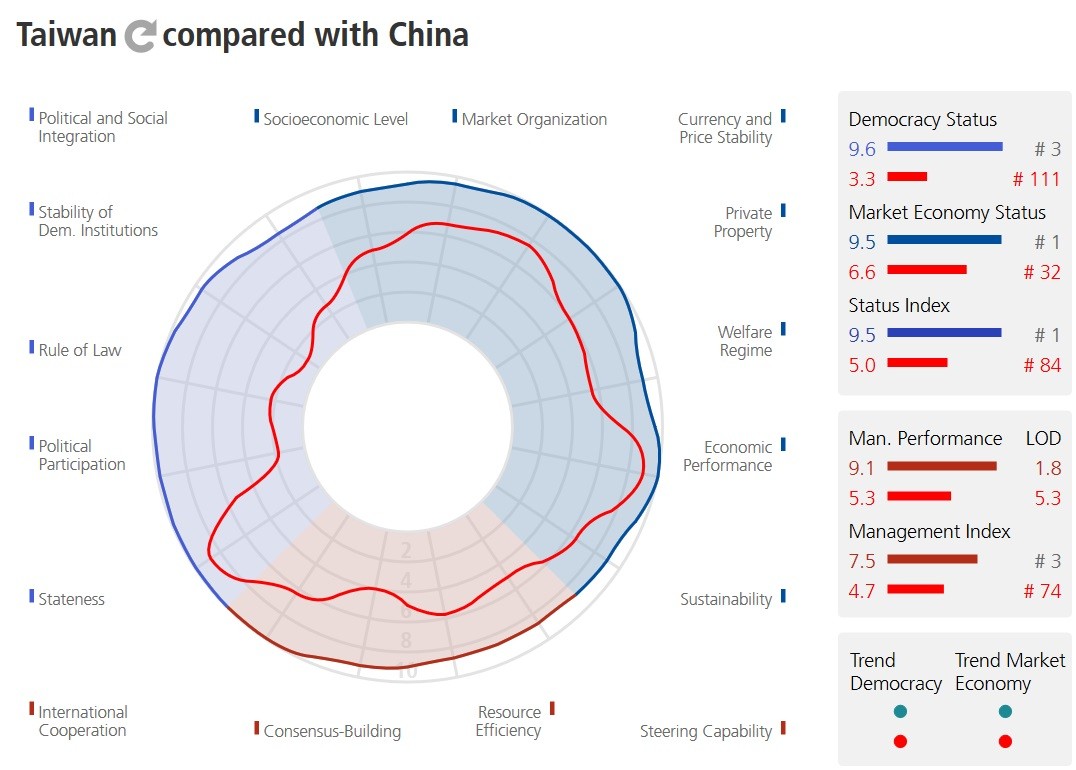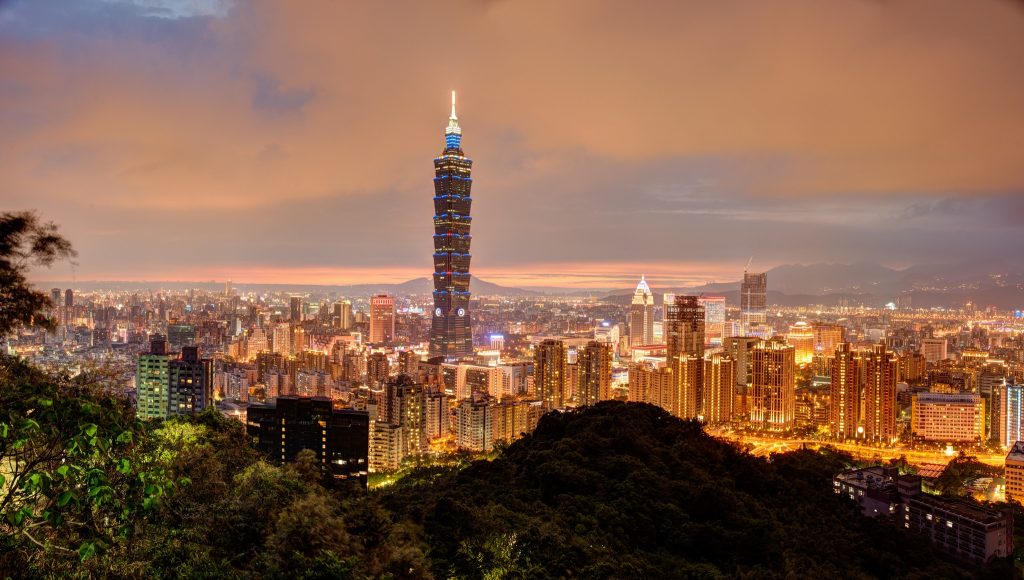And the winner is … Taiwan
Ranking at the top of the BTI Status Index, Taiwan’s transformation from an authoritarian developing country to a thriving democracy and market economy deserves special attention. What are the recipes for the island state’s political and economic success?
Taiwan is the Status Index top performer among the 129 countries surveyed in the 2016 edition of the BTI. Having achieved impressive gains in economic and social policies (rank 1 in market economy status), the island nation also features stable democratic traditions securely anchored in society (rank 3 in democracy status). Visionary political leadership, robust political and economic institutions and a vibrant civil society account for this success.
1. The right leaders at the right time
During the politically brutal “White Terror” era, Chiang Kai-shek began to lay the foundations for the first Chinese economic miracle in the 20th century. Determined to retake mainland China, his regime successfully built up at record speed a protectionist state-capitalist economy. As U.S. economic and political support began to wane toward the end of the 1950s, Chiang steered the economy away from import substitution toward export-oriented growth. The fact that Taiwan was to rapidly number among Asia’s so-called Tiger states is in large part accountable to Chiang’s efforts.

In the long run, economic success rarely takes place without political liberalization (one of the largest experiments with this rarity is taking place on the other side of the Taiwan Strait). In this respect, the decision in 1987 by Chiang’s son and successor Ching-kuo to lift martial law represented a major step forward for the country. However, in terms of promoting Taiwanese democracy, President Lee Teng-hui introduced the most significant reforms including the legalization of opposition parties (1991), the country’s first free and fair parliamentary elections (1991/1992), and the first direct election of Taiwan’s head of state (1996). By acknowledging and respecting the constitutional limitations to his time in office, Lee paved the way for a peaceful transition of leadership and the country’s democratic future.
2. Building and strengthening inclusive institutions
Leadership can only go so far in explaining Taiwan’s successful transformation. Having failed to gain a political or economic foothold on the Chinese mainland, Chiang Kai-shek’s immigrant regime found rather favorable conditions for economic development on the island of Taiwan in 1949. Still-intact structures and institutions established during Japanese occupation and relatively developed agricultural and industrial infrastructures were ready to be tapped. Indeed, during the first half of the 20th century, the island’s economy had grown more quickly than Japan’s, with rice production increasing from 1910 to 1938 by 133%. Politically, the Kuomintang benefited from the legacy of Japanese colonial institutions, including a full-fledged bureaucracy, a police system and centralized judicial administration.
As argued by Daron Acemoglu and James Robinson in their famous study “Why Nations Fail“, the extent to which political and economic institutions are inclusive is the key factor of a nation’s success. Introduced in 1959, Taiwan’s 19-point program of Economic and Financial Reform provided market participants with better access to economic resources and created a stable environment in which economic institutions such as a central bank system and capital markets could take hold. In addition, it created an environment that favored private companies and attracted foreign investment. According to the BTI, Taiwan now numbers among those states featuring the most robust organization of the market and competition, strongest currency and price stability, and the best protection of private property rights.
A strong education system with high-quality primary, secondary, tertiary and vocational institutions is a key factor of social mobility in the country. Introduced in the 1950s, Taiwan’s basic social welfare system has helped keep income gaps from widening too far. According to current studies by the Asian Development Bank, Taiwan features less severe income inequality than other high-income countries or even the communist People’s Republic.
However, social inequality in Taiwan is growing and its impact increasingly felt – a trend facing several countries. Though effective (compared with other Asian countries) in protecting its citizens from absolute poverty and other social risks, Taiwan’s social welfare system cannot protect its citizens from stagnating wages.
3. A mobilized civil society
Social injustice is one of the major issues mobilizing Taiwan’s vocal and ideologically polarized civil society. The country’s “third sector” keeps a watchful eye over government and economic activity by demanding democracy and fair economic competition, as well as a functional social welfare system. Taiwanese civil society therefore contributes considerably to ensuring Taiwan’s success now and in the future.
Taiwan’s politically sensitized citizens respond vehemently to instances of clientelism, bribery and other abuses of public office. Public debate over political misbehavior, as demonstrated by recent cases such as the judicial corruption scandal, have fueled public awareness of corruption in the country (which is one reason why many Taiwanese remain skeptical of the country’s high BTI ranking). In addition, the country’s civil society effectively articulates the economic interests of professional associations, as well as those of various social classes and groups.
Civil society also brings new momentum into the established party system. The political struggle over the passage of a trade deal with China is a case in point. In spring 2014, activists unlawfully occupied the Legislative Yuan for three weeks to protest the government’s poor handling of the parliamentary ratification of the Cross-Strait Services Trade Agreement (CSSTA). The protesters, who enjoyed considerable public support, agreed to end their occupation only in exchange of the government agreeing to put the trade deal on hold until it has introduced greater public oversight and transparency of cross-strait agreements. The Sunflower Movement’s political victory has contributed to a deepening of democratic rules and procedures, and helped preserve the current level of political independence vis-à-vis China.
Taiwan’s top ranking in the BTI 2016, which outgoing President Ma Ying-jeou highlighted in a public statement, is as much an achievement of political leadership and functioning democratic institutions over protracted periods of time as it is proof of a vigilant civil society.
Robert Schwarz is Project Manager at the Bertelsmann Stiftung’s Transformation Index (BTI).
Photo: Taipei Skyline from Elephant Mountain, by Dave Wilson, via flickr.com, CC BY-NC-ND 2.0

